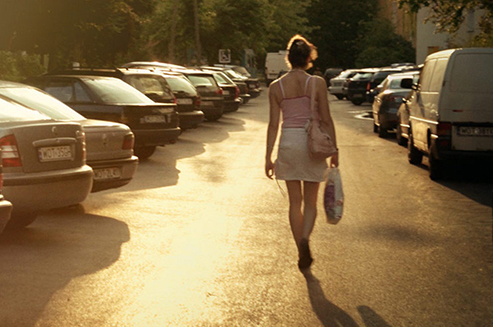The empathic narrative of the life of Marianna significantly combines the legal, social and emotional problems with which transgender people struggle. Although the film is set in Poland, it presents difficulties that are common to different circumstances, political systems and cultural backgrounds. In this sense, the story of Marianna becomes a representative for the LGBT community. Yet, it is hard not to notice that the main character’s efforts are motivated by universal needs: self-expression, acceptance, honesty, love, and intimacy. In this way, “Call me Marianna” behaves as the condensed reflection of the mechanisms in which every person is involved.
For 43 years, the protagonist lived in a man’s body. Relatively quickly, he realizes that he feels he is a woman, his male body therefore becoming a source of immense suffering and even disgust. In Poland, around the 1980s, the concerns relating to transsexual people were essentially non-existent. Wojtek (the previous name of Marianna), feels the wish for closeness, love and yearned for an ordinary, quiet life. Having a family would provide such conditions. So he becomes a married man and a father, and for years lives a quiet life. Finally, he decides to fight for himself and his true, feminine identity. To achieve happiness, he makes a number of painful separations from his loved ones, experiencing shame, rejection, and humiliation. Some of these experiences derive from natural relations, whereas others are the consequences of rigid legal regulations. When Marianna’s personal journey falls at last into place, she gets another blow of fate and ultimately proves to fight for herself.
The strength of the film lies not in a clichéd story, but rather in its authenticity. The film, based on true events, took its inspiration from real stories. The director accompanied Marianna with a camera for several years. The women developed a close and trusting relationship, preparing a project through which the viewer can deeply identify with the intimate emotions of the main character. The result is a beautiful, subtle, honest picture of a lonely person, who fights for her dignity and love.
“Call me Marianna” will be screened during the Play Poland Film Festival in four cities. Additionally, in Edinburgh, the screening on November 12th will be followed by a Q&A with James Morton, from the Scottish Transgender Alliance, Manager at the Equality Network.
Aberdeen – November 11, at 8:45 p.m. | Belmont Filmhouse
Edinburgh – November 12, at 6:15 p.m. | Filmhouse
London – November 26, at 9:00 p.m. | Clapham Picturehouse
Further details about the screenings can be found at Play Poland Film Festival
Photo © A frame from the “Call Me Marianna” directed by Karolina Bielawska /press release


